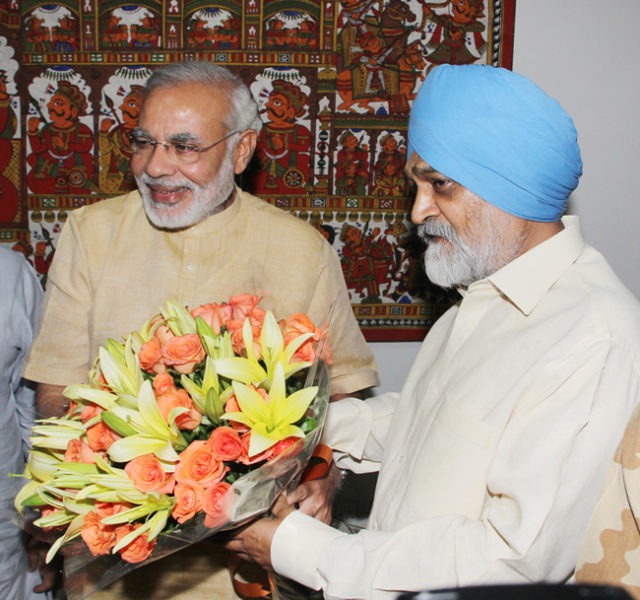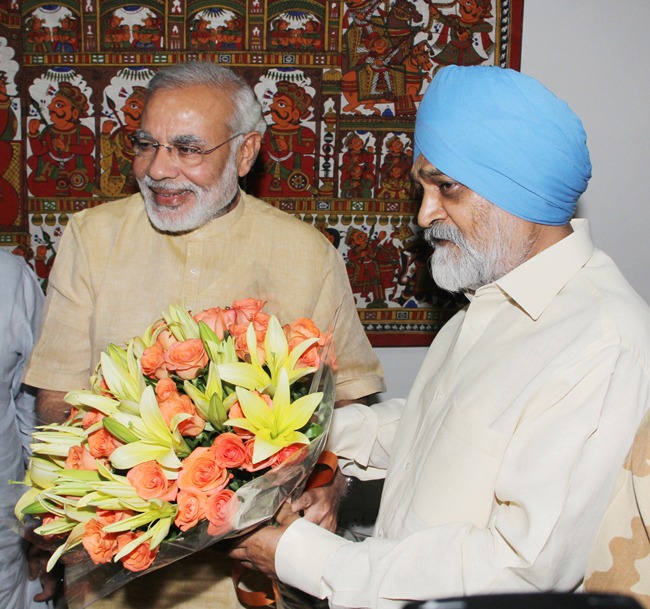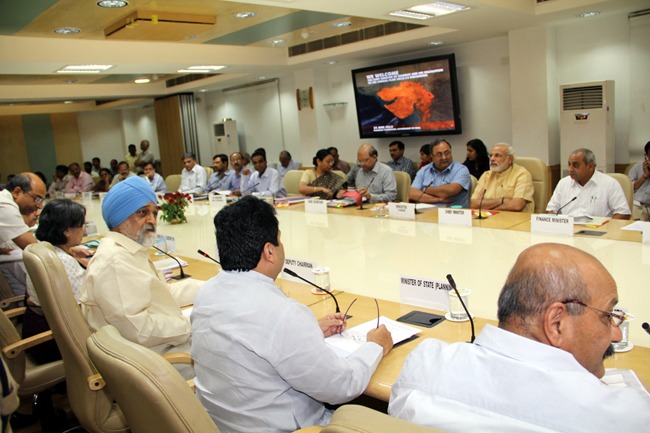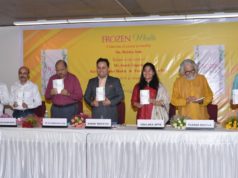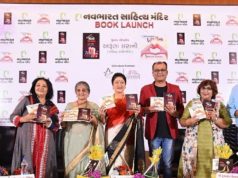Chief Minister Narendra Modi spoke to the media after a high level meeting with the Planning Commission to finalize Gujarat’s Annual Plan of 2013-14. Shri Modi said that the Government had worked on a plan of Rs. 58,500 crore but the Planning Commission felt Gujarat is more capable and thus a plan of Rs. 59,000 crore was approved.
{loadposition adinarticle} The Chief Minister said that Gujarat is making its contribution in India’s growth. About the plan, he pointed that 42% allotment has been made to the social sector. He affirmed that Gujarat’s motto is Sabka Saath, Sabka Vikas (All together, growth for all) and that the Government wants to ensure that the underprivileged and the marginalized sections of society get the fruits of Gujarat’s development.
The Deputy Chairperson of the Planning Commission Dr. Montek Singh Ahluwalia said that Gujarat is one of the fastest growing states. Gujarat’s Finance Minister Shri Nitinbhai Patel and Minister for Planning Shri Saurabhbhai Patel accompanied the Chief Minister. Minister of State in the Centre Shri Rajiv Shukla was present during the meeting.
MORE DETAILS OF GUJARAT’S ANNUAL PLAN FOR 2013-14
The Annual Plan for Gujarat for 2013-14 was today finalized at Rs. 59,000 crore at a meeting held here between Gujarat Chief Minister Shri Narendra Modi and Planning Commission Deputy Chairman Shri Montek Singh Ahluwalia. Planning Commission has increased Rs 500 crore more against proposed original plan of Rs 58, 500 crore by state government. The current plan size is 15.68 per cent higher than the previous year’s plan size of Rs. 51,000 crore and reflects the state’s strong financial position and vibrant development trajectory.
Gujarat, widely known as the growth engine of India, has shown a high growth trajectory by achieving an average of 10.24 per cent growth rate from 2002-2012, which is highest among large states in India. Gujarat has also registered an increase of 13.8 per cent in the per capita income for 2011-12, which has been estimated at Rs. 89,668 as against Rs. 78,802 in 2010-11, at current prices. Agriculture, despite all challenges, has been a major success indicator with 11.11 per cent growth rate during the decade 2001-02 to 2011-12.
Gujarat Government’s development vision is guided by continued emphasis on improving Human Development Index. Keeping to its determination that growth must advance hand in hand with human development, Gujarat’s Annual Plan allocation for Social Services Sector for the current fiscal is proposed at Rs. 24,586 crores, more than 42 per cent, which includes education, health, drinking water supply, housing and welfare of Backward Classes, women and child empowerment.
Gujarat Chief Minister Shri Narendra Modi said that space and speed of state development is sustainable and Gujarat’s contribution for nation’s growth is noteworthy. Gujarat is committed to apply planned development as a meaningful, relevant and effective process towards faster inclusive growth. The 42 per cent allocation earmarked in the Annual Plan for social sector will benefit the backward sections of the society, he added.
In the meeting with Planning Commission members, Gujarat Chief Minister Shri Narendra Modi apprised that the State Government has taken new initiatives and implemented newer technology-driven approach to ensure that the meaning of growth is translated into the lives of people. He further emphasized that improving HDI and inclusive growth, promoting better governance, empowering youth and women and ensuring active participation of people in governance remain major priorities.
The plan outlay of Rs. 3,850 crore in 2013-14 for the education sector is an unprecedented increase of 42.59 per cent over last year. The State Government’s sustained efforts of the innovative Kanya Kelavani – Shala Praveshotsav in the last decade have created a huge improvement in the enrolment and bringing the drop out ratios, to 2.06 per cent in primary education.
In the health sector, State Government has intensified its comprehensive and holistic health programmes, covering the entire State comprising 18,600 villages with 1.5 crore children. There is an increase of 25 per cent in the outlay for health sector from Rs. 3,060 crore to Rs. 3,800 crore.
The indicators in maternal and child health, namely MMR and IMR have shown an accelerated rate of improvement in the last few years. The improvement in IMR in the last decade has been in the order of 18 units while it was 10 units in the previous decade. Institutional deliveries, too, have risen from 58 per cent to 95 per cent during that period.
The sex ratio which has been falling steadily at the All India level in 1991, 2001,and 2011 census i.e. from 945 to 927 and to 914. In Gujarat however, the decade between 2001 and 2011 has been seen a reversal in this falling trend i.e from 883 to 890.
Gujarat has carried out various campaigns to save the girl child and initiatives such as e-Mamta, Chiranjeevi Yojana, Beti Bachao, Sickle cell Programme etc have majorly contributed to the state government’s efforts to curb the falling sex ratio.
Gujarat pioneered an innovative approach to skill upgradation, that is the Kaushalya Vardhan Kendra (KVK). 335 KVKs have been started in the last two and half years and almost 8 lakh trainees have benefited, of which 59 per cent are women. Gujarat has also trained was also imparted to 3.32 lakh persons in a short time under eMPOWER scheme in computer and information technology at the taluka level and now plans to train a further 2 lakh persons under this programme. Gujarat state consistently provides new jobs on an average of more than 11 per cent increase in fresh employment opportunities. Gujarat has provided an outlay of Rs 841 crore for this sector.
Gujarat is one of the most urbanized among larger States in the country with 42 per cent of its population living in cities and towns. The Swarnim Jayanti Mukhyamantri Shaheri Vikas Yojana has been continued in the 12th Five Year Plan with a total outlay of Rs. 15,000 crore. In 2013-14, an outlay of Rs. 6,650 crore has been made for the urban sector with a focus on augmenting urban infrastructure.
Gujarat has also pioneered the concept of RURBAN: to provide urban-like amenities in larger villages while still retaining the rural soul in these places. This approach would also help tackle rural-urban migration.
The State Government has undertaken a massive campaign to provide housing to the urban and rural poor. Moving ahead of the Indira Awas Yojana, Gujarat has provided housing assistance to BPL families with a score 17 to 20 in rural areas. Now, Gujarat will launch the Mukhyamantri Awas Samrudhhi Yojana with an outlay of Rs. 4,400 crore in 2013-14, for augmenting affordable housing for the poor and the lower middle class in rural and urban areas.
The Gujarat state-wide Grid covers 3.85 crore population in 11,235 villages and 131 towns. A provision of Rs. 2,700 crore is made for the sector.
Continuing to remain at the forefront of industrial development, Gujarat is poised to develop Dholera SIR over 50,000 hectares which would be the largest planned industrial area in the world.
The Planning Commission has recommended the plan size of Rs.2,83,623 crore for the 12th Five Year Plan, against the 11th Five Year Plan size of Rs. 1,28,500 crore.
Gujarat CM pointed out several issues which are pending with various Ministries in the Central Government, affecting the progress as well as the pace of development of the State and its financial resources. Despite repeated representations from State Government there has been no positive response from the GoI. It is unfortunate that some issues remain pending for years altogether.
In the meeting, many issues were informed by the Gujarat CM through an audio-visual presentation which include:
? The opaque and irrational policies relating to pricing and allocation of coal and natural gas have caused immense loss to national income, as about 5000 MW of installed power generation capacity lies unutilized in Gujarat alone.
? Though Gujarat is a power-surplus state but in absence of a National Transmission Grid, the state cannot transfer surplus power to other power-deficit states.
? Environment sub-group has not given permission for putting gates at the Sardar sarovar Dam. Therefore, Gujarat is losing benefits of additional irrigation of almost 7 lakh hectares and 40 per cent increase in power generation. It creates a loss of Rs. 3,788 crores per annum.
? As the lack of coordination among the Central Ministries has become a bottleneck and development in the state is held up.
? The lack of clarity on environment clearance for mining has also stalled innumerable state power projects.
? Planning Commission has recommended for revised AIBP guidelines but Union Ministry of water Resources has not issued any revised guidelines. Therefore, irrigation projects are affected for the want of funds.
? The Central Government has failed to define an effective policy and funding assistance for coastal security. A cogent national strategy to deal with developmental issues in areas vulnerable to the spread of militant extremism is also lacking.
? The Centre has introduced RTE Act 2009 but it creates long-term financial liabilities for the State while SSA provides only a fraction of the additional costs involved. Therefore, the Central Government should fund the entire additional burden on the state.
? Shri BK Chaturvedi Committee has given a report on philosophy, format and funding pattern of Centrally-sponsored schemes. These recommendations should be accepted.
? The Central Government has changed formula applied to calculation on royalty on crude oil. Therefore, Gujarat is suffering losses of Rs. 8,600 crores.
? CST compensation claims of Rs. 4500 crore are pending with GoI.
Sources: CM’s website / Gujarat Information Bureau
Click here to read complete text speech of Shri Modi during his meeting with the Planning Commission
Watch the Video Presentation at the meeting with the Planning Commission to firm up Gujarat’s Annual Plan for 2013-2014


